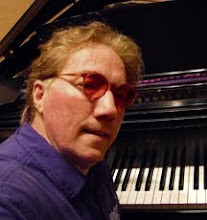In the course of playing and teaching piano, I often encounter people who took piano lessons as children, but who are afraid that they will never be able to get to the point where they can pick up where they left off. I also meet people who are very clear about not wanting their present piano study to resemble that of their childhood. In addition, some of my students are young people who are looking for a different approach to playing the piano. In none of these cases do I attempt to offer a new or instant system that promises any kind of instrumental mastery with less work or practice time than would have been required in the old days.
What I do suggest to those who are not interested exclusively in the traditional classical repertoire, is that they consider learning to improvise at the piano to some degree. There is a tremendous resistance to this idea in our musical culture, particularly among pianists. Virtually none of us who had traditional piano lessons were taught how to improvise or trust our ears. It seems like such a tall order to take responsibility for two hands playing separate original musical ideas simultaneously. Well, without some prior experience, it can be daunting in the beginning. In fact, for some students, what is needed might be described as almost a form of therapy rather than piano lessons. Consider that the traditional way of learning and playing the piano involves three major senses: sight, touch, and hearing. In fact, sight does double-duty in that it is used to first of all locate the hands over the keys, and secondly, to decipher the little black dots on the page in the process of rendering this notation into sound. Now if you suddenly remove the little black dots from the picture, you have deprived sight of its primary role in this process, and you have removed from one quarter to one third of the sensory activity commonly associated with playing the piano. That can be disconcerting. Of course the eyes are still used to see the keys, but ask George Shearing or Ray Charles how important that is. Other scary issues that arise when you improvise involve confidence and trust. How much confidence do you have in yourself, and will you trust your instincts? How much control are you willing to surrender?
I'm not suggesting that dealing with these issues eliminates the need for understanding chord theory, or other specific disciplines associated with improvisation, but there are books about those things, and a good teacher can help the student address them. Coming to terms with one's own self-image and fears however, is a more difficult subject to pursue from a book, and there is no patented approach for a teacher to help the student in handling this.
If you're going to improvise music, you should do it without fear of sounding foolish, and without fear of seeming foolish because you are going against what everybody you know thinks about playing music. Bear in mind that improvisation has been marginalized, if not completely ridiculed, in academic music circles for at least the past one hundred years. You would not have even heard the word improvisation in a university music department or conservatory until these institutions were finally forced to admit jazz studies into the curriculum sometime beginning in the 1960s. Still, there was no mention of classical musicians learning to improvise as they did from about the 15th century through the 19th century. As an aura of sacredness began to surround the music of the "great composers," the idea of altering any of their written notes began to seem heretical. It is most interesting and important for the student to realize that there was a time period of considerable duration in which ALL musicians were expected to be able to make up their own music, or at least improvise using someone else's music as a starting point. Bach, Handel, Mozart, Beethoven, Schumann, and Liszt all would have expected musicians to "interpret" their music in ways which would probably shock us today. Keyboardists who could not improvise in the style of their time, had no chance of a professional career. So it was really a requirement back then.
There are certainly many styles of music available to us today. Why not begin exploring the possibilities of improvising your own music in one of the styles of our time? Talk to your teacher(s). Find a teacher who is willing to help you. Check out Music For People. Or just begin to let yourself go while you practice. Close your eyes, listen to how chords sound. How do they make you feel? And don't worry about mistakes! And if you get brave enough, turn on a recorder of some kind. You might even find you actually like what you hear.
Friday, February 10, 2012
Subscribe to:
Post Comments (Atom)




No comments:
Post a Comment